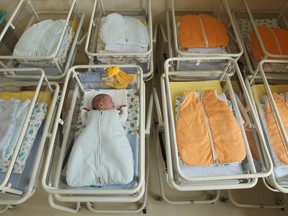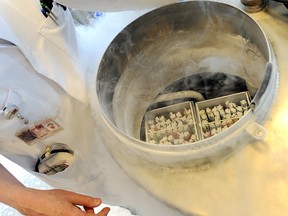Delaying Pregnancies, Freezing Fertile Eggs
"[As a result of the global pandemic with social and dating lives upended], a lot of people feel they lost three years of their reproductive life.""In ceetain provinces or territories you cannot even see a fertility specialist, because they don't exist [there]. So, freezing your eggs and flying to a city that does it, isn't attainable.""Not everyone is going to do this. But, certainly, for younger people who have chosen to do this, they have felt it to be a great option for them.""If someone is freezing their eggs at age 30 or younger, and we have 20 eggs, then we can guesstimate that in the future there's probably about a 55 percent chance of a pregnancy there."Dr. Sony Sierra, president, Canadian Fertility and Andrology Society"Society is sort of telling us, dictating, especially to women, what they should do -- get your education, travel, get a job, buy your house, meet a partner, and follow that path. But of course, our reproductive anatomy hasn't caught up.""[Egg freezing can alleviate pressure], that sort of societal pressure, even the pressure a woman feels for herself on her future family-building plans. This is something they can do in their early to mid-20s, even their early 30s."Carolynn Dube, executive director, patient group Fertility Matters Canada"[Women may feel pressured to freeze their eggs] especially where this is a 'benefit' paid for by the employer.""First and foremost, it really fails to address some of these bigger systemic questions we have about caregiving issues in the workplace, and whether we should be thinking about creating policies that accommodate caregiving as opposed to just delaying fertility."Dr. Vanessa Gruben, professor, department of law, University of Ottawa
 |
Among businesses who offered employees the opportunity to take advantage of egg freezing for female staff, Apple and Facebook were among the initiators, and other major tech companies and big banks did the same; the bonus of employer-paid egg preservation. Fertility clinics take to hosting virtual webinars for those curious about "all things egg freezing".
Fertility specialists and patient advocates feel it is important that young women be aware of age-related changes affecting both quantity and quality of their fertile eggs. And though freezing eggs for future use when women are prepared to conceive, is an expensive procedure, there is no guarantee of a pregnancy outcome or live birth in the final analysis. A recent study found egg-freezing workplace perks can appear to be a type of social pressure hinging on the belief that women should focus on work, not babies.
There are others who argue the primary reason women elect to place their eggs in deep freeze for future use, is that their current situation is one absent of stable reproductive partners. Women at birth possess roughly one to two million immature egg cells (oocytes); egg reserves that decrease with age. A woman will have 25,000 oocytes left by age 37, and by age 51, the average age of menopause, a woman will have about 1,000 egg cells left, according to the American College of Obstetrics and Gynecologists.
If eggs are frozen when the woman is young, there will be a higher opportunity for successful pregnancy, and lower incidence of miscarriage once they're ready to be used. The process consists of a woman injecting herself with hormonal drugs daily for a two-week period. The injection goes into the belly or upper thighs, meant to stimulate her ovaries to produce some ten to 15 mature eggs rather than the usual one egg monthly. The more eggs frozen, the greater likelihood one will be fertilized with sperm to develop into an embryo, leading to pregnancy.
Eggs a e retrieved from the ovaries once the optimal size and number are present, via an ultrasound-guided needle, then flash-frozen to a solid, glasslike state within seconds and stored in liquid nitrogen tanks. According to fertility doctors, the optimal freeze time for eggs is in the woman's 20s or early 30s years, when ovarian reserves are high. Age at cryopreservation and the number of eggs frozen both affect success rates.
Based on fifteen years of real-life "frozen-egg outcomes", one U.S. study at a New York University-affiliated fertility clinic found overall, 39 percent of women had at least one child from their frozen eggs; 51 percent if the woman was younger than 38 when her eggs were frozen, and 70 percent if the under-38 woman thawed at least 20 eggs.
"We can manipulate the uterus to be able to accept an embryo at any age, really but] we don't transfer embryos over age 49", said Dr. Sierra. Birthrates are not affected by the length of time in cold storage, nor does the age of the woman at the time an embryo created with a thawed egg is transferred to her womb. There are potential risks from egg freezing that can include bleeding, infection and internal injury, according to a Mount Sinai Fertility video.
Ovarian hyperstimulaton syndrome can occur when a woman's ovaries swell and leak fluid into the body. The published risk is about one in 200. One in ten women on hormones will experience hot flashes, mood changes and some abdominal discomfort, but there does not appear to be increased risk of breast or ovarian cancer.
More than one egg-freezing cycle is often undertaken to produce the optimal number of eggs. The cost of which is up to $10,000 each cycle. Medication comes in at $6,000 to $8,000. Plus an annual storage fee of $300. Topped up by the cost involved of in vitro fertilization.
 |
| A vessel containing a women’s frozen egg cells. |
Labels: Cryiopreservation, Delaying Pregnancy, Freezing Oocytes, In Vitro Fertilization, Motherhood in Abeyance

0 Comments:
Post a Comment
<< Home